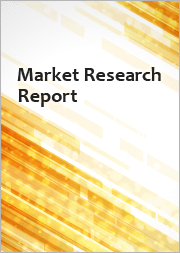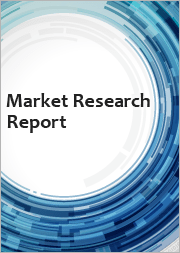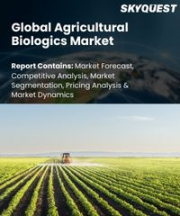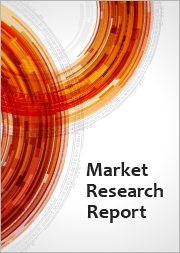
|
시장보고서
상품코드
1734910
바이오 농약 시장 예측(-2032년) : 제품 유형, 작물 유형, 제제, 용도, 최종 사용자, 지역별 분석Biopesticides Market Forecasts to 2032 - Global Analysis By Product (Natural products, Microbials, Macrobials, Semiochemicals and Other Products), Type, Crop Type, Formulation, Application, End User and By Geography |
||||||
Stratistics MRC에 따르면 세계의 바이오 농약 시장은 2025년에 38억 달러를 차지하고 예측 기간 동안 CAGR 11.3%로 성장하고 2032년에는 82억 달러에 이를 전망입니다.
바이오 농약은 박테리아, 균류, 바이러스, 식물 등의 생물에 유래하는 천연의 해충 방제제입니다. 미생물 농약(미생물을 사용), 식물농약(식물 유래의 화합물), 생화학 농약(해충 방제를 실시하는 천연 유래의 물질)로 분류됩니다.
유기 무역 협회(OTA) 조사에 따르면 미국의 유기 제품 매출은 2020년부터 2021년까지 630억 달러를 넘습니다.
유기농 식품에 대한 수요 증가
유기농 식품에 대한 수요 증가는 환경 친화적이고 지속 가능한 농법의 사용을 장려함으로써 생물 농약 업계를 뒷받침하고 있습니다. 이 변화는 작물의 건강과 수확을 촉진하는 동시에 유기 인증 요구 사항에도 적합합니다.
더 짧은 저장 수명과 민감성
바이오 농약의 저장수명의 단축과 감수성의 높이는 시장에 큰 과제를 가져오고, 보급의 방해가 되고 있습니다. 이러한 요인은 특히 기후가 다른 지역에서는 물류상의 과제가 되어 대규모의 사용을 방해합니다.
기술 진보
기술의 진보는 생산효율, 제제의 안정성, 적용방법을 향상시킴으로써 바이오 농약시장을 크게 밀어 올렸습니다. 화학농약에 대한 의존을 줄이고 지속가능한 농법을 지원하며 작물의 수율을 증가시킵니다.
화학농약에 비해 완만한 작용
화학농약에 비해 바이오 농약의 효과는 느리기 때문에 업계의 성장에는 큰 장애가 됩니다. 그 결과, 농산물의 수율이 감소하고, 경제적인 손실이 발생합니다. 그 때문에 생물 농약은 효능이 느리고, 특히 해충의 압력이 강하고, 장기적인 생태학적 이점에 관한 지식이 부족한 지역에서는 받아들이기 어렵습니다.
COVID-19의 영향
COVID-19의 대유행은 공급망의 중단, 노동력 부족, 제품 유통의 지연을 일으켜 바이오 농약 시장을 혼란시켰습니다. 하지만 유행기간 동안 지속가능한 농업과 식량안전에 대한 의식이 높아지면서 환경친화적인 작물보호 솔루션에 대한 관심이 높아졌고, 바이오 농약 시장은 서서히 회복되고 다시 성장했습니다.
예측기간 동안 미바이오 농약분야가 최대가 될 전망
미생물 생물 농약 분야는 예측 기간 동안 가장 큰 시장 점유율을 차지할 것으로 예측됩니다. 이러한 제품은 특이성이 높고 비표적 종에 대한 해를 최소화하고 토양의 건전성을 촉진하기 위해 종합적 병해충 관리(IPM) 시스템에 최적입니다.
엽면 살포 분야는 예측 기간 동안 가장 높은 CAGR이 예상된다.
예측 기간 동안 잎 표면 살포 분야는 높은 효율성, 신속한 작용 및 적목 현상으로 인해 가장 높은 성장률을 보일 것으로 예측됩니다. 시스템과의 적합성은 지속 가능한 농업을 더욱 지원합니다. 또한, 잎면 살포는 살포가 간단하고, 투여량이 적어, 작물 잔류 레벨을 저감할 수 있기 때문에 환경 의식이 높은 농가에게 매력적인 선택이 되어, 바이오 농약 제품 수요를 세계적으로 밀어 올리고 있습니다.
최대 점유율을 차지하는 지역:
예측 기간 동안 아시아태평양은 지속 가능한 농업에 대한 수요 증가, 식품 안전에 대한 의식 증가, 정부 지원 조치로 최대 시장 점유율을 차지할 것으로 예측됩니다. 인도, 중국, 호주 등의 국가들은 병충해 종합 관리 전략의 일환으로 생물 농약을 채택하고 있으며 세계 환경 목표에 부합하여 수출 경쟁력을 높이고 있습니다.
CAGR이 가장 높은 지역:
예측 기간 동안 유기 제품에 대한 소비자의 선호도가 높아지면서 북미가 가장 높은 CAGR을 나타낼 것으로 예측됩니다. 생물학적 대체물에 대한 유리한 규제와 자금제공에 의한 정부의 지원도 시장의 확대를 뒷받침하고 있습니다.
무료 맞춤 서비스
이 보고서를 구독하는 고객은 다음 무료 맞춤설정 옵션 중 하나를 사용할 수 있습니다.
- 기업 프로파일
- 추가 시장 기업의 종합적 프로파일링(3개사까지)
- 주요 기업의 SWOT 분석(3개사까지)
- 지역 세분화
- 고객의 관심에 응한 주요국 시장 추계, 예측, CAGR(주: 타당성 확인에 따름)
- 경쟁 벤치마킹
- 제품 포트폴리오, 지리적 존재, 전략적 제휴에 기반한 주요 기업 벤치마킹
목차
제1장 주요 요약
제2장 서문
- 개요
- 이해관계자
- 조사 범위
- 조사 방법
- 데이터 마이닝
- 데이터 분석
- 데이터 검증
- 조사 접근
- 조사 자료
- 1차 조사 자료
- 2차 조사 정보원
- 전제조건
제3장 시장 동향 분석
- 성장 촉진요인
- 억제요인
- 기회
- 위협
- 제품분석
- 용도 분석
- 최종 사용자 분석
- 신흥 시장
- COVID-19의 영향
제4장 Porter's Five Forces 분석
- 공급기업의 협상력
- 구매자의 협상력
- 대체품의 위협
- 신규 참가업체의 위협
- 경쟁 기업간 경쟁 관계
제5장 세계의 바이오 농약 시장 : 제품별
- 천연 제품
- 미생물
- 매크로비알
- 세미오케미컬
- 기타 제품
제6장 세계의 바이오 농약 시장 : 유형별
- 미생물 바이오농약
- 생화학적 바이오 농약
- 식물 통합 보호제(PIP)
- RNA 기반 생물 농약
- 펩티드계 바이오 농약
제7장 세계의 바이오 농약 시장 : 작물 유형별
- 곡물
- 과일 및 채소
- 지방종자 및 콩류
- 기타 작물 유형
제8장 세계의 바이오 농약 시장 : 제제별
- 액체
- 건조
제9장 세계의 바이오 농약 시장 : 용도별
- 엽면 살포제
- 종자 처리
- 토양 처리
- 수확 후
제10장 세계의 바이오 농약 시장 : 최종 사용자별
- 농업
- 비농업
제11장 세계의 바이오 농약 시장 : 지역별
- 북미
- 미국
- 캐나다
- 멕시코
- 유럽
- 독일
- 영국
- 이탈리아
- 프랑스
- 스페인
- 기타 유럽
- 아시아태평양
- 일본
- 중국
- 인도
- 호주
- 뉴질랜드
- 한국
- 기타 아시아태평양
- 남미
- 아르헨티나
- 브라질
- 칠레
- 기타 남미
- 중동 및 아프리카
- 사우디아라비아
- 아랍에미리트(UAE)
- 카타르
- 남아프리카
- 기타 중동 및 아프리카
제12장 주요 발전
- 계약, 파트너십, 협업, 합작투자
- 인수합병
- 신제품 발매
- 사업 확대
- 기타 주요 전략
제13장 기업 프로파일링
- Bayer AG
- BASF SE
- Syngenta AG
- Corteva Agriscience
- FMC Corporation
- Certis Biologicals
- Valent BioSciences LLC
- Andermatt Biocontrol AG
- Koppert Biological Systems
- Bioworks, Inc.
- Stockton(STK)
- Novozymes A/S
- UPL Limited
- Chr. Hansen Holding A/S
- Lallemand Inc.
According to Stratistics MRC, the Global Biopesticides Market is accounted for $3.8 billion in 2025 and is expected to reach $8.2 billion by 2032 growing at a CAGR of 11.3% during the forecast period. Biopesticides are natural pest control agents derived from organisms such as bacteria, fungi, viruses, or plants. Unlike synthetic pesticides, biopesticides are generally considered environmentally friendly, targeting specific pests without harming beneficial insects, humans, or animals. They can be classified into microbial pesticides (using microorganisms), botanical pesticides (plant-derived compounds), and biochemical pesticides (naturally occurring substances that control pests). Biopesticides are widely used in sustainable agriculture as part of integrated pest management (IPM) strategies to reduce chemical pesticide use, promote biodiversity, and maintain ecological balance.
According to the Organic Trade Association (OTA) survey, organic product sales in the US exceeded USD 63 billion between 2020 and 2021.
Market Dynamics:
Driver:
Rising Demand for Organic Food
The growing demand for organic food is boosting the biopesticides industry by encouraging the use of environmentally friendly and sustainable farming practices. Farmers are using biopesticides as safer substitutes for synthetic chemicals as customers demand more product free of chemicals. This change complies with organic certification requirements while promoting crop health and yields. As a result, the market for biopesticides is expanding significantly due to global governmental support for organic agriculture, increased awareness of food safety, and environmental concerns.
Restraint:
Shorter Shelf Life and Sensitivity
The shorter shelf life and sensitivity of biopesticides pose significant challenges to the market, hindering widespread adoption. Their limited stability under various environmental conditions reduces their effectiveness and storage capabilities, leading to higher costs and waste. These factors create logistical challenges, particularly in regions with varying climates, and discourage large-scale usage. As a result, manufacturers face difficulties in meeting demand, limiting the growth potential of the biopesticides market.
Opportunity:
Technological Advancements
Technological advancements have significantly boosted the biopesticides market by enhancing production efficiency, formulation stability, and application methods. Innovations in microbial fermentation, nanotechnology, and precision agriculture have enabled the development of more effective and targeted biopesticide products. These advancements reduce reliance on chemical pesticides, support sustainable farming practices, and increase crop yields. Additionally, improved delivery systems such as encapsulation technologies enhance shelf life and field performance, making biopesticides a more viable and attractive option for modern agriculture.
Threat:
Slow Action Compared to Chemical Pesticides
Biopesticides' sluggish effect when compared to chemical pesticides presents a substantial impediment to industry growth. Fast-acting chemical options are frequently preferred by farmers seeking instant pest management, particularly in cases of severe infestations. Adoption may be discouraged by lower agricultural yields and financial losses as a result of this delayed efficacy. Therefore, biopesticides' slower efficacy makes them less acceptable, especially in areas with strong pest pressure and little knowledge of their long-term ecological advantages.
Covid-19 Impact
The COVID-19 pandemic disrupted the biopesticides market by causing supply chain interruptions, labor shortages, and delays in product distribution. Restrictions on transportation and international trade impacted the availability of raw materials and hindered manufacturing processes. However, increased awareness of sustainable agriculture and food safety during the pandemic boosted interest in eco-friendly crop protection solutions, leading to a gradual recovery and renewed growth in the biopesticides market post-pandemic.
The microbial biopesticides segment is expected to be the largest during the forecast period
The microbial biopesticides segment is expected to account for the largest market share during the forecast period as these products, derived from naturally occurring bacteria, fungi, or viruses, reduce reliance on synthetic chemicals, aligning with increasing regulatory and consumer demand for greener agriculture. Their high specificity minimizes harm to non-target species and promotes soil health, making them ideal for integrated pest management (IPM) systems. This growing acceptance and effectiveness are accelerating market expansion across both conventional and organic farming sectors.
The foliar spray segment is expected to have the highest CAGR during the forecast period
Over the forecast period, the foliar spray segment is predicted to witness the highest growth rate, due to its high efficacy, rapid action, and targeted application. This method enhances the bioavailability of active ingredients, resulting in better pest control while minimizing environmental impact. Its compatibility with integrated pest management (IPM) systems further supports sustainable agriculture practices. Additionally, foliar sprays are easy to apply, require lower doses, and reduce crop residue levels, making them an attractive option for eco-conscious farmers and boosting demand for biopesticide products globally.
Region with largest share:
During the forecast period, the Asia Pacific region is expected to hold the largest market share due to rising demand for sustainable agriculture, increasing awareness about food safety, and supportive government initiatives. These eco-friendly pest control solutions reduce chemical residues in crops and promoting long-term agricultural productivity. Countries like India, China, and Australia are embracing biopesticides as part of integrated pest management strategies, aligning with global environmental goals and enhancing export competitiveness. This shift supports both environmental sustainability and farmer profitability across the region.
Region with highest CAGR:
Over the forecast period, the North America region is anticipated to exhibit the highest CAGR, owing to increased consumer preference for organic products. This shift is driving innovation and investment in eco-friendly pest control solutions that reduce reliance on synthetic chemicals. Government support through favorable regulations and funding for biological alternatives is also bolstering market expansion. As a result, the sector is not only enhancing crop yields and farmer profitability but also contributing positively to environmental and human health across the region.
Key players in the market
Some of the key players profiled in the Biopesticides Market include Bayer AG, BASF SE, Syngenta AG, Corteva Agriscience, FMC Corporation, Certis Biologicals, Valent BioSciences LLC,Andermatt Biocontrol AG,Koppert Biological Systems, Bioworks, Inc., Stockton (STK), Novozymes A/S, UPL Limited, Chr. Hansen Holding A/S and Lallemand Inc.
Key Developments:
In April 2025, BASF announced its first Canadian Master Research Agreement (MRA) with the University of Toronto, marking a significant milestone in the company's efforts to expand its research collaborations in North America. This partnership aims to streamline innovation projects and foster collaboration between BASF researchers and Canadian academics.
In October 2024, BASF made a strategic partnership with Aspen Aerogels to enhance its aerogel product offerings and expand its market reach. This partnership is set to drive innovation in aerogel technologies, particularly in high-performance insulation materials.
Products Covered:
- Natural products
- Microbials
- Macrobials
- Semiochemicals
- Other Products
Types Covered:
- Microbial biopesticides
- Biochemical biopesticides
- Plant-incorporated protectants (PIPs)
- RNA-based biopesticides
- Peptide-based biopesticides
Crop Types Covered:
- Cereals & Grains
- Fruits & Vegetables
- Oilseeds & Pulses
- Other Crop Types
Formulations Covered:
- Liquid
- Dry
Applications Covered:
- Foliar Spray
- Seed Treatment
- Soil Treatment
- Post-Harvest
End Users Covered:
- Agricultural
- Non-agricultural
- Other Applications
Regions Covered:
- North America
- US
- Canada
- Mexico
- Europe
- Germany
- UK
- Italy
- France
- Spain
- Rest of Europe
- Asia Pacific
- Japan
- China
- India
- Australia
- New Zealand
- South Korea
- Rest of Asia Pacific
- South America
- Argentina
- Brazil
- Chile
- Rest of South America
- Middle East & Africa
- Saudi Arabia
- UAE
- Qatar
- South Africa
- Rest of Middle East & Africa
What our report offers:
- Market share assessments for the regional and country-level segments
- Strategic recommendations for the new entrants
- Covers Market data for the years 2022, 2023, 2024, 2026, and 2030
- Market Trends (Drivers, Constraints, Opportunities, Threats, Challenges, Investment Opportunities, and recommendations)
- Strategic recommendations in key business segments based on the market estimations
- Competitive landscaping mapping the key common trends
- Company profiling with detailed strategies, financials, and recent developments
- Supply chain trends mapping the latest technological advancements
Free Customization Offerings:
All the customers of this report will be entitled to receive one of the following free customization options:
- Company Profiling
- Comprehensive profiling of additional market players (up to 3)
- SWOT Analysis of key players (up to 3)
- Regional Segmentation
- Market estimations, Forecasts and CAGR of any prominent country as per the client's interest (Note: Depends on feasibility check)
- Competitive Benchmarking
- Benchmarking of key players based on product portfolio, geographical presence, and strategic alliances
Table of Contents
1 Executive Summary
2 Preface
- 2.1 Abstract
- 2.2 Stake Holders
- 2.3 Research Scope
- 2.4 Research Methodology
- 2.4.1 Data Mining
- 2.4.2 Data Analysis
- 2.4.3 Data Validation
- 2.4.4 Research Approach
- 2.5 Research Sources
- 2.5.1 Primary Research Sources
- 2.5.2 Secondary Research Sources
- 2.5.3 Assumptions
3 Market Trend Analysis
- 3.1 Introduction
- 3.2 Drivers
- 3.3 Restraints
- 3.4 Opportunities
- 3.5 Threats
- 3.6 Product Analysis
- 3.7 Application Analysis
- 3.8 End User Analysis
- 3.9 Emerging Markets
- 3.10 Impact of Covid-19
4 Porters Five Force Analysis
- 4.1 Bargaining power of suppliers
- 4.2 Bargaining power of buyers
- 4.3 Threat of substitutes
- 4.4 Threat of new entrants
- 4.5 Competitive rivalry
5 Global Biopesticides Market, By Product
- 5.1 Introduction
- 5.2 Natural products
- 5.3 Microbials
- 5.4 Macrobials
- 5.5 Semiochemicals
- 5.6 Other Products
6 Global Biopesticides Market, By Type
- 6.1 Introduction
- 6.2 Microbial biopesticides
- 6.3 Biochemical biopesticides
- 6.4 Plant-incorporated protectants (PIPs)
- 6.5 RNA-based biopesticides
- 6.6 Peptide-based biopesticides
7 Global Biopesticides Market, By Crop Type
- 7.1 Introduction
- 7.2 Cereals & Grains
- 7.3 Fruits & Vegetables
- 7.4 Oilseeds & Pulses
- 7.5 Other Crop Types
8 Global Biopesticides Market, By Formulation
- 8.1 Introduction
- 8.2 Liquid
- 8.3 Dry
9 Global Biopesticides Market, By Application
- 9.1 Introduction
- 9.2 Foliar Spray
- 9.3 Seed Treatment
- 9.4 Soil Treatment
- 9.5 Post-Harvest
10 Global Biopesticides Market, By End User
- 10.1 Introduction
- 10.2 Agricultural
- 10.3 Non-agricultural
11 Global Biopesticides Market, By Geography
- 11.1 Introduction
- 11.2 North America
- 11.2.1 US
- 11.2.2 Canada
- 11.2.3 Mexico
- 11.3 Europe
- 11.3.1 Germany
- 11.3.2 UK
- 11.3.3 Italy
- 11.3.4 France
- 11.3.5 Spain
- 11.3.6 Rest of Europe
- 11.4 Asia Pacific
- 11.4.1 Japan
- 11.4.2 China
- 11.4.3 India
- 11.4.4 Australia
- 11.4.5 New Zealand
- 11.4.6 South Korea
- 11.4.7 Rest of Asia Pacific
- 11.5 South America
- 11.5.1 Argentina
- 11.5.2 Brazil
- 11.5.3 Chile
- 11.5.4 Rest of South America
- 11.6 Middle East & Africa
- 11.6.1 Saudi Arabia
- 11.6.2 UAE
- 11.6.3 Qatar
- 11.6.4 South Africa
- 11.6.5 Rest of Middle East & Africa
12 Key Developments
- 12.1 Agreements, Partnerships, Collaborations and Joint Ventures
- 12.2 Acquisitions & Mergers
- 12.3 New Product Launch
- 12.4 Expansions
- 12.5 Other Key Strategies
13 Company Profiling
- 13.1 Bayer AG
- 13.2 BASF SE
- 13.3 Syngenta AG
- 13.4 Corteva Agriscience
- 13.5 FMC Corporation
- 13.6 Certis Biologicals
- 13.7 Valent BioSciences LLC
- 13.8 Andermatt Biocontrol AG
- 13.9 Koppert Biological Systems
- 13.10 Bioworks, Inc.
- 13.11 Stockton (STK)
- 13.12 Novozymes A/S
- 13.13 UPL Limited
- 13.14 Chr. Hansen Holding A/S
- 13.15 Lallemand Inc.



















